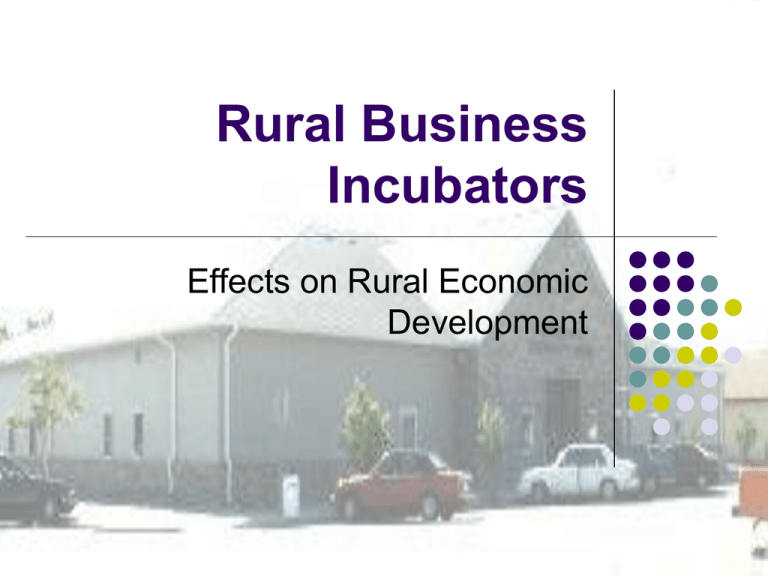Rural Business Incubators
advertisement

Rural Business Incubators Effects on Rural Economic Development Rural Business Incubators What are they? Who might be attracted by these Incubators? What are problems facing successful development of Rural Business Incubators? Recommendations Examples of Rural Business Incubators Rural Business Incubators Defined Managed by public, private, and/or nonprofit organizations and academic institutions, incubators offer qualified businesses a range of products critical to business success, including space, shared office services, business services, financial resources, and tenant networking Businesses participating in incubators may have a better chance of success as operating costs are lowered, access to business counseling, and networking among tenants is encouraged to facilitate information gathering. Rural Business Incubators Defined The National Business Incubator Association definition: A business incubator is a comprehensive business assistance program targeted to startup and early stage firms with the goal of improving their chances to grow into healthy, sustainable companies. Businesses are allowed to start up in the incubators but must move out after a prearranged time period. Rural Business Incubator Potential Tenants A successful rural business incubator may have a certain criteria that potential tenants must meet but who might be attracted to a rural area for a start up business. “Lone Eagles” are perhaps an increasing source of potential tenants to rural business incubator facilities. Rural Business Incubator Potential Tenants “Lone Eagle” – Well-educated entrepreneurs who use the latest telecommunications gear to sell specialty goods and services all over the country, if not world wide. Often times these individuals are tired of dealing with the ills of the urban environment such as crime, traffic congestion, smog, poor schools, burdensome taxes, and the high cost of living. These individuals tend to be drawn to rural areas by natural beauty, outdoor recreation, no commute times, and lower crime rates. Rural Business Incubator Potential Tenants Location of Purchaser Local Area Lone Eagle 15.2% Locally Oriented Firm 89.8% Elsewhere in 21.9% State Elsewhere in 20.9% Region Elsewhere in U.S. 24.9% 9.1% Canada 8.1% 0% Other Countries 9% .1% .7% .3% Rural Business Incubator Potential Tenants Table illustrates the Lone Eagle’s reliance on computer technology and telecommunications. Must also have access to Overnight Parcel Service (UPS or Fed X) and must be within a reasonable distance to a airport. Incubators could provide the appropriate computer technology and telecommunications infrastructure as well as training to these potential tenants making the decision to locate in a particular community that much more attractive. Problems Facing Successful Rural Business Incubators Funding Lack of community understanding of the incubator’s role Inadequate facilities or space for clients Lack of full-time staff dedicated to the incubator Lack of governing board involvement Inability to follow up with client’s (graduates) addressing client issues Difficulty recruiting clients It has been determined that size of community has generally no affect on success or failure of a Rural Business Incubator Recommendations for Successful Rural Incubators Conduct feasibility study preceding development of a Rural Incubator Program. A study should examine problems and give clear direction in overcoming them. Those involved in supporting and developing an incubator should bridge political and organizational boundaries to ensure that everyone in the community who can bring value to startup companies is coordinating their efforts for maximum impact. Recommendations for Successful Rural Incubators Where entrepreneurship has not traditionally been a strong part of the culture or economic development strategy, incubation proponents should work to educate and demonstrate the impacts that startup businesses can have on the community. Incubator developers should make it a top priority to hire and adequately compensate an experienced top executive to oversee the program and ensure that individual has the skills to help companies succeed. Recommendations for Successful Rural Incubators Incubator developers should pursue all pathways possible to ensure that the facility is technologically up-to-date to meet the needs of client companies. Rural communities developing incubation programs should continue to place emphasis on improving infrastructure-from roads to communications technology-through all means available. This will help ensure business retention. Examples of Rural Incubators Maddock, North Dakota A community which had decreased in population from 750 to 550 from 1986 to 1989. Maddock Economic Development Corporation (volunteer organization consisting of 10 to 15 individuals) started 15 years ago to try to address Maddock’s out migration. The answer was a technology center that placed all of Maddock’s economic development efforts under one roof. Examples of Rural Incubators (Maddock, ND) Decision to build technology center was based on funding. Money appeared to be readily available to construct Rural Business Incubators, so Maddock pursued this course of action. $400,000 from USDA low interest loans, $200,000 from city of Maddock, $149,000 in USDA Grants, and $25,000 from the state of North Dakota. The building is now self-sufficient, pulling in enough rent from its assorted tenants to pay $2,350 in dept service each month plus $1,650 in operating expenses. Examples of Rural Incubators (Maddock, ND) The 12,000 sq. foot building features fiber optic connection which offers the ability for 51 T-1 telephone line connections. Current tenants include the Benson County Information Technology Coordinator, Kids on the Block Child Development Center, Homelink Televoice, Young Entrepreneurs, Herm’s Repair (computer sales and service), Innes Publishing, Marianne Sears (CPA), Farmers Union Insurance, Early Head Start and Head Start, Agri ImaGIS, Touchstone Transport, and Nodak Insurance. A study by the Maddock Economic Development Corps. Indicates that the center employs 50 people, 75% of which would not be employed in Maddock if it were not for the center. Examples of Rural Incubators (Maddock, ND) Implications of Center Education Has begun computer classes to educate residents on how to operate computers and surf the internet and hope to teach classes on website design. Offers for computer terminals providing free internet access to residents. A renewed hope Before the center opened the pharmacist and grocery store closed up. After center was constructed a new pharmacist moved into town. He stated the reason for locating in Maddock was that the center showed the towns character to survive. The grocery store also reopened after center was constructed. Examples of Rural Incubators (Watford City, ND) Set up a “virtual” community technology center, served by high-speed telecommunications, where local citizens upgrade their technology skills to move into new or more advanced jobs. The promise of a tech-skilled workforce attracted three companies to the area, generating 80 new jobs.








